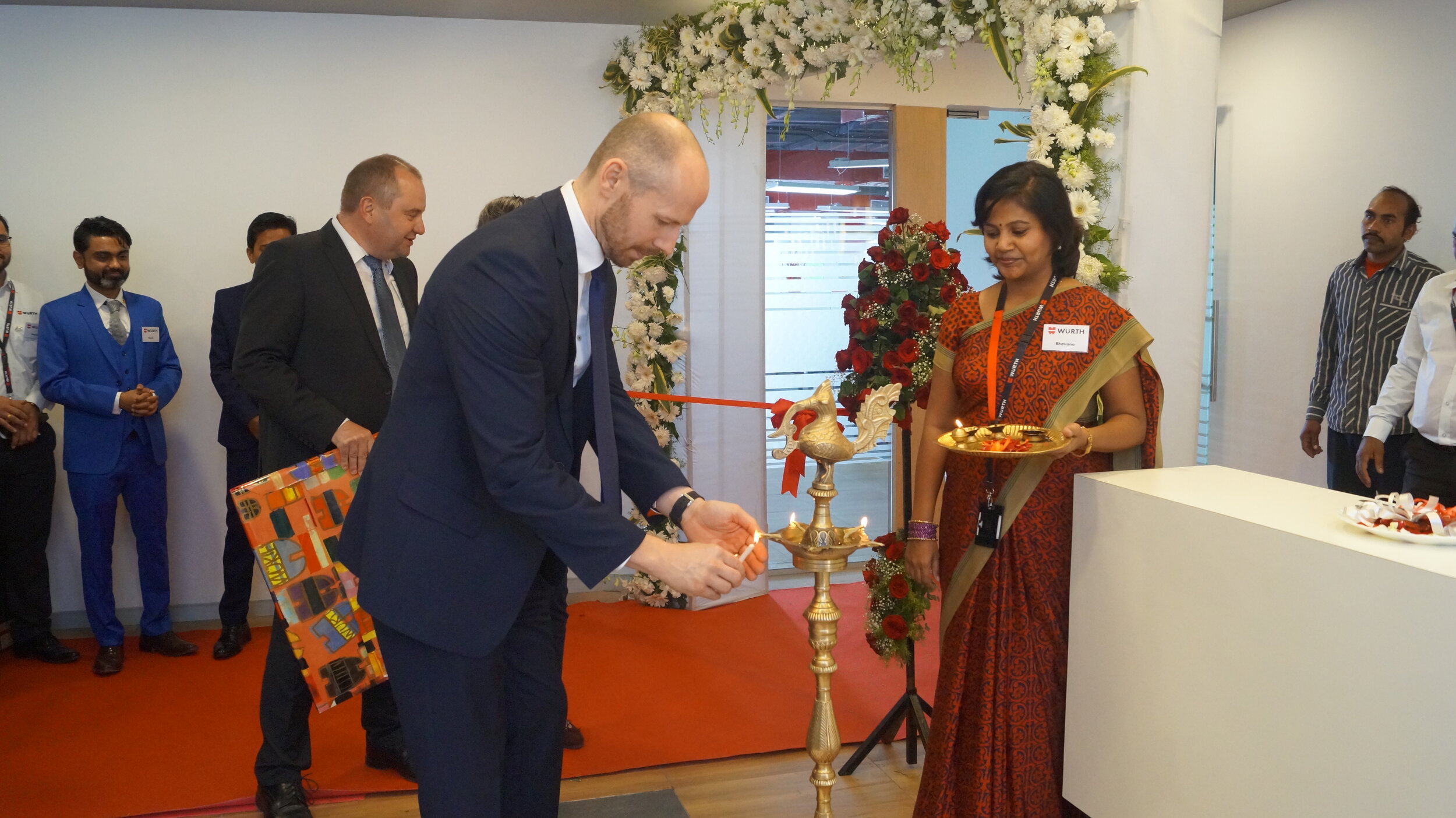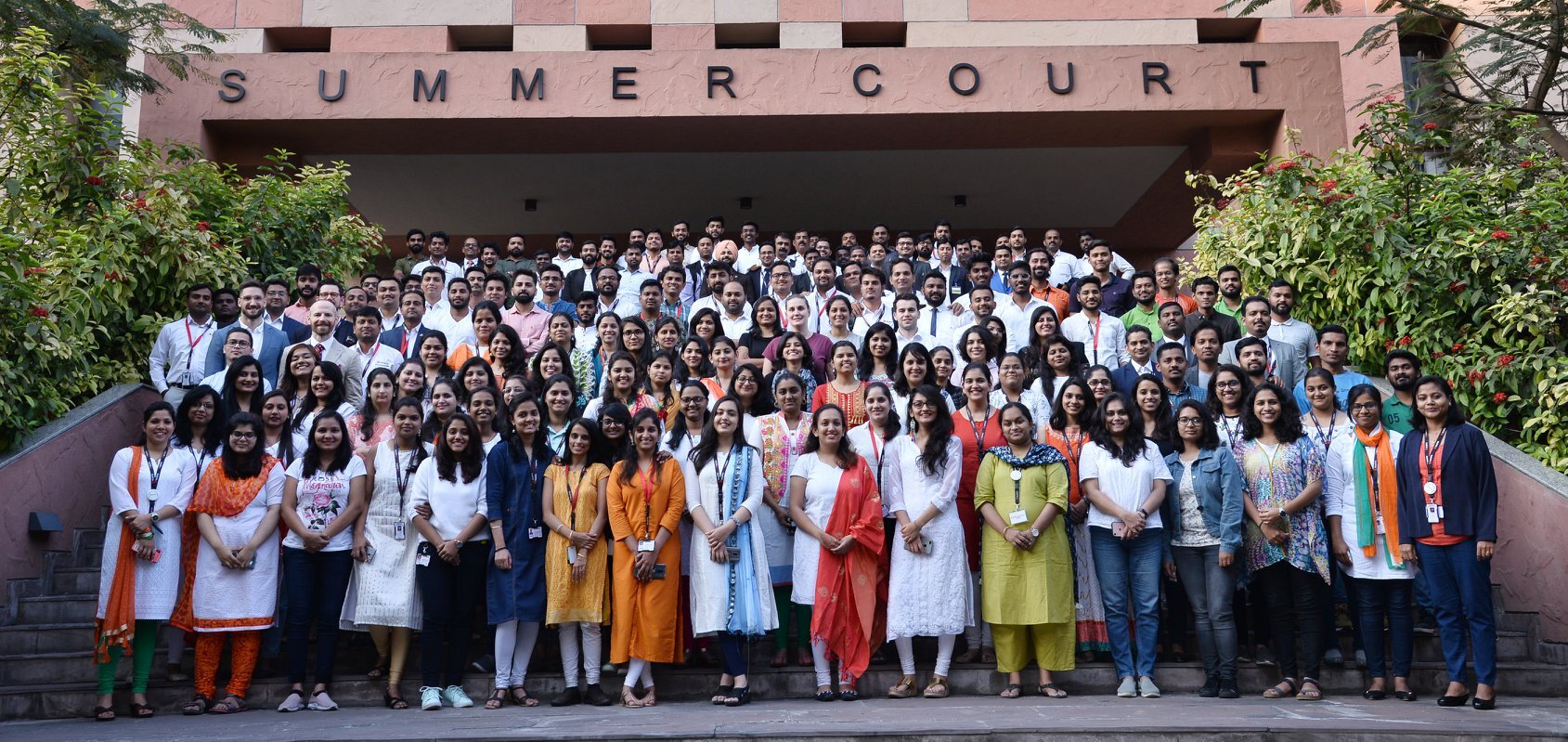For more than 70 years, Germany's Würth has been the world's best-known supplier of assembly technology and, with an annual turnover of some EUR 14.5 billion, one of Germany's 100 most influential companies. "A large company like ours could therefore not ignore India," says Norman Dentel, CEO of Wuerth Industrial Services India Pvt. Ltd. "India is one of the largest growth markets in the world, perhaps even the largest growth market in the world. Every self-respecting company should take advantage of the opportunities this market offers". Norman Dentel shares his four tips for companies who want to become successful in India.
CEO Norman Dentel at the opening ceremony of one of Würth's offices in Pune
1. Choose the right legal form for your market entry
Würth opened its first private limited company in Mumbai in 1994. "That was a Würth-Line company," explains Norman Dentel. "That's what we call the companies that carry out our core business under the red W logo: selling assembly materials, including screws, screw accessories, anchors, tools, chemical-technical products, personal protective equipment and providing complete supply chain solutions with various types of vending machines and Kanban systems." In the following years, Würth's German headquarters received more and more requests from large, international customers looking for professional supply chain solutions for their various entities worldwide, including in India. "In 2005, we therefore decided to establish a new company, Wuerth Industrial Services India Pvt. Ltd. in Pune, to be able to meet those requests and to offer our multinational customers fast service and local support. Because we brought a solid customer base of international, existing customers with us from Germany, we never had any start-up problems in India and there was room to grow immediately."
Read more about the different legal forms you can choose from and the benefits they offer if you want to set up a business in India:
Wuerth Industrial Services India is therefore much more than just a supplier of fasteners and assembly materials. "The company in India consists of four segments. A team that focuses on the core business of the company, a business unit that provides international customers with outsourcing support from India, a department that develops Customer Relation Management software and an innovation centre called "iHUB", where experts work on e-learning, augmented reality, virtual reality and graphic design applications. They recently built a virtual reality tool that allows our customers to virtually visit our company and our warehouses. In these corona times, social distancing solutions are a hot topic and we are working hard to implement them at different levels."
"In order to grow successfully in a country like India, it is very important to carefully consider the best legal form for the company prior to market entry," is the advice of Würth's top executive in India. "For us, the private limited company is a tried and tested business model. It was therefore logical to choose this in India as well. The big advantage is that companies own the shares of the subsidiaries. As the owner, you have the possibility to run the company yourself, or to appoint directors without having to take into account other shareholders. In addition, the credit rating of a private limited is higher and it is easier to raise funds from venture capitalists, members and even the foreign companies."
2. Take plenty of time to recruit good staff
Wuerth Industrial Services India employs over 330 people, many of whom have been with the German wholesaler for around ten years. "That is very unusual in India, but we try to separate the wheat from the chaff during the recruitment process so that we only have the people left who really fit in with us," explains the managing director in India. "Often the candidates look good on paper but we find the real talents by asking detailed questions during the interviews. So dare to take the time for the selection process and to really get to know the candidates before you make a final decision."
European companies are popular employers in India, according to the CEO. "European companies have a high status in the country, are well organised, reliable and support the personal development of employees. So there are always enough candidates available for an open position, but of course you want to find the employees with the right mindset and who won't hop to the next company after a year because they can earn more there. We are therefore very open about what we are looking for, a talent that is open to long-term employment with a job performance-related income that is always paid on time. We see that this openness, about what a candidate can expect, is very much appreciated."
Some employees of Wuerth Industrial Services India Pvt. Ltd. in front of their office in Pune
3. Find the right balance between private and business life in the workplace
"Leadership mainly requires emotional intelligence and a certain instinct to avoid fluctuations. This is no different in India than in other countries," says the Wuerth Industrial Services CEO. "Nevertheless, I have also learnt a lot in recent years about cultural differences and how to position myself to better reach my Indian team. In Germany we are very focused on facts and other reliable factors, but in India emotions are much more important. For example, I can't give an introduction speech in India where I only tell about my +20 years at Würth and the different countries I have visited over the years, I would bore my audience to death. If, on the other hand, I share my personal experiences in India or talk about my family, it is very welcome. India is a country where emotions really bring people together." Yet Norman Dentel also sees that German business acumen is appreciated by his employees. "Giving appreciation and feedback on the work done is just as important as discussions about family and other private matters. You shouldn't bend too far and let individual sensitivities and interpretations take over in the workplace, that could lead to unnecessary discussions. A good balance between private and business life is key in India."
"India is the most exciting place I have had the opportunity to work in 20 years at Würth."
4. Go step by step
According to Norman Dentel, companies often think they can apply the same business strategy in India that they use in China. "But make no mistake, India is not one big country. It is 28 smaller states with their own languages, cultures and customs. Each state has its own government agencies and therefore its own rules. You cannot make one business plan for the entire country and ignore these state differences entirely. Doing business in India is therefore not a sprint but a marathon, you have to conquer the country step by step."
"It is therefore important to build into your business goals also the space to grow quietly," explains the top executive. "A simple example; in India we see a high consumption of raw materials and a lot of environmental pollution, which goes against the value of our company. We try to counter this by offering green solutions to our customers, but in India, sustainable awareness is still very low. It will probably take years before real changes become visible in the country. At the same time, you can also find very positive examples, such as the clean cities of Mysore or Kochi. So, continued investment will yield results in the long run, but you have to be persistent. I have given half of my heart to India, the other half remains in Germany. Despite the fact that sometimes you really have to show a lot of patience, privately and professionally, India remains the most exciting place where I have had the opportunity to work in 20 years at Würth."
Safely entering the Indian market
There are several ways to enter the Indian market. IndiaConnected offers you the opportunity to set up your office in India quickly, easily and cost-effectively without having to register your own entity. We call this the business incubator.
With the Business Incubator, you set up your own organization without incurring the costs of having your own office. You can hire your own staff, who will be on our payroll. This gives you flexibility to grow and easily saves 1,000 to 2,000 euros per month in compliance, administration and registration costs.
Discover all the benefits of the Business Incubator here:



